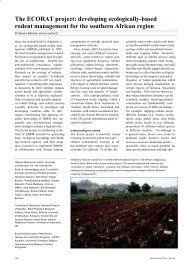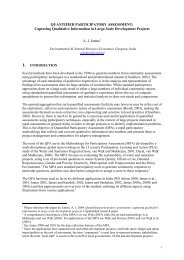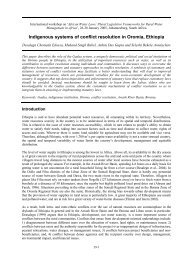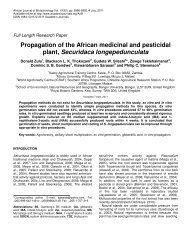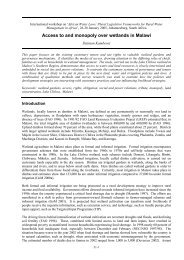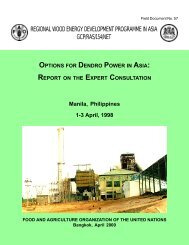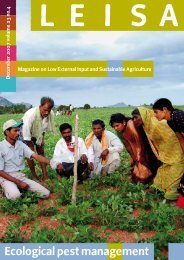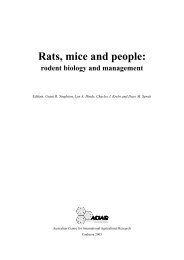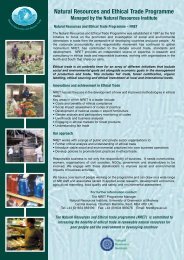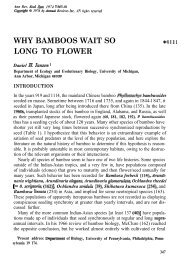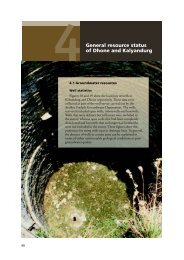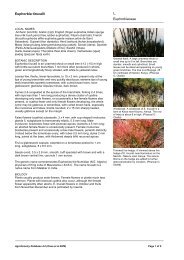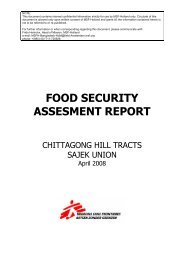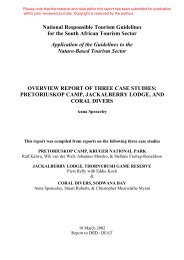Access to Rural Non-Farm Livelihoods - Natural Resources Institute
Access to Rural Non-Farm Livelihoods - Natural Resources Institute
Access to Rural Non-Farm Livelihoods - Natural Resources Institute
Create successful ePaper yourself
Turn your PDF publications into a flip-book with our unique Google optimized e-Paper software.
able <strong>to</strong> train young people more effectively – currently this happens on an ad hoc basis, but it<br />
would be better if it were formally endorsed as policy.<br />
However, there are still numerous problems in the education sec<strong>to</strong>r. Among these is the<br />
recruitment of skilled teachers – the district currently has 450 teachers in post, but needs<br />
another 300. Although the country as a whole has a surplus of teachers, people are reluctant<br />
<strong>to</strong> work is isolated rural areas with poor facilities and accommodation. There are also<br />
problems with Head Teachers who do not adhere <strong>to</strong> their terms of reference, and teacher as<br />
well as pupil absenteeism. The Inspec<strong>to</strong>r of Schools would like <strong>to</strong> spend more of his time<br />
(e.g., three days per week) visiting schools <strong>to</strong> moni<strong>to</strong>r and address some of these problems,<br />
although this is difficult 64 .<br />
Teacher training occurs at ten co-ordinating centres in the district. The district provides funds<br />
for training through a capacity building programme, and World Vision also support capacity<br />
building and training. In addition, the central government is currently assisting with<br />
classroom construction through the School Facility Grant Scheme, and Concern is supporting<br />
the upgrading of existing buildings.<br />
World Vision focuses specifically on the education and training of orphans, many of whom<br />
have had <strong>to</strong> drop out of school <strong>to</strong> care for sick household members and/or work <strong>to</strong> survive.<br />
Those who wish <strong>to</strong> go back <strong>to</strong> school are supported and provided with materials. Others, who<br />
are not interested or are <strong>to</strong>o old now, are given training in basic life skills and are supported<br />
in apprenticeship schemes with local artisans, who in turn are given training in training skills.<br />
World Vision is also working with schools <strong>to</strong> establish training centres where older children<br />
can lean vocational skills such as carpentry, metalwork, mo<strong>to</strong>r mechanics, and tailoring even<br />
if they drop out of school, although in some cases this has also become part of the<br />
mainstream curriculum. Schools are supported with infrastructure (classrooms) and technical<br />
<strong>to</strong>ols. There is also some training in business skills.<br />
Vocational training is also available <strong>to</strong> “vulnerable” youths through OCBO, who provide two<br />
year training courses in carpentry, masonry, metalwork, bicycle and mo<strong>to</strong>rcycle repairs, and<br />
sewing and tailoring. To date 500 youths have graduated, and many of these have gone on <strong>to</strong><br />
start up their own businesses. However, others lack the capital <strong>to</strong> purchase the equipment<br />
necessary <strong>to</strong> use their skills, or lack the necessary business skills <strong>to</strong> sustain their activities.<br />
Thus in addition <strong>to</strong> vocational training OCBO has identified a need for improved access <strong>to</strong><br />
credit and training in business skills. OCBO has also assisted 500 marginalised children with<br />
secondary school fees.<br />
3.7 Health and social services<br />
The Department of Health’s main programmes are in preventative care, curative services for<br />
both in- and out-patients, and labora<strong>to</strong>ry services. They also support vertical programmes<br />
implemented by central government, such as TB and leprosy control. Until recently they also<br />
covered water and environmental sanitation, but this has now become its own independent<br />
department. The department has a five year Health Strategy Plan based on the Ministry of<br />
Health’s national plan, which feeds in<strong>to</strong> the DDP. Service delivery has been decentralised <strong>to</strong><br />
64 “We do no good by sitting around in the office. However, our plans <strong>to</strong> visit schools more frequently are<br />
hindered by the lack of funds for petrol and the poor roads that take up our time by longer journeys.<br />
How can we do moni<strong>to</strong>ring and evaluation of education without such basic needs?”<br />
Mr Mutaaya S. Abu Baker, Rakai, 10/10/2000<br />
30



